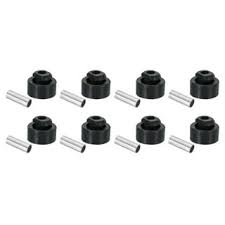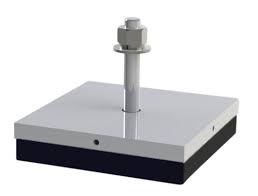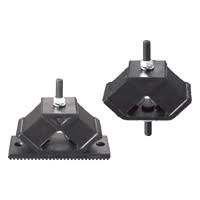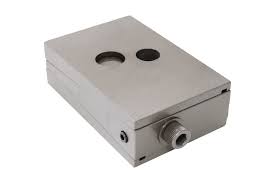Flexible vibration isolators are an essential component for ensuring the proper functioning and longevity of machinery. By providing a cushion for equipment and isolating it from external vibration, flexible vibration isolators offer numerous advantages for industrial and commercial applications. This article will explore the many benefits of using flexible vibration isolators for machinery, including improved equipment performance, reduced maintenance costs, and enhanced workplace safety.
Flexible vibration isolators are beneficial for machinery for several reasons. They are able to effectively reduce and isolate vibrations, providing enhanced equipment stability and performance. These isolators can also help to prolong the lifespan of machinery by minimizing wear and tear from excessive vibrations. Additionally, they can contribute to a safer and more comfortable work environment by reducing noise levels and limiting the transmission of vibrations to surrounding structures. Finally, flexible vibration isolators often require low maintenance and are cost-effective, making them a practical choice for industrial and commercial machinery applications.
Flexible vibration isolators offer various advantages for machinery. They effectively minimize vibrations, enhancing equipment stability and performance. This, in turn, can contribute to a longer lifespan for machinery by reducing wear and tear caused by excessive vibrations. Additionally, vibration isolators can create a safer and more comfortable work environment by decreasing noise levels and limiting the transmission of vibrations to surrounding structures. These isolators also tend to require minimal maintenance and are cost-effective, making them a practical choice for industrial and commercial machinery applications.
The Importance of Flexible Vibration Isolators in Industrial Machinery

In various industries, the use of flexible vibration isolators has become crucial for ensuring the stability and performance of machinery and equipment. These isolators are designed to absorb and dampen vibrations, preventing them from transferring to surrounding structures, thus reducing the risk of damage and improving overall operational efficiency. Additionally, flexible vibration isolators play a key role in enhancing precision and accuracy, particularly in applications such as aerospace, medical devices, and heavy machinery. By utilizing flexible vibration isolators, industries can minimize structural vibrations and optimize the lifespan and performance of their equipment. As technology continues to advance, the demand for innovative and effective vibration isolators will only continue to grow.
Flexible vibration isolators are crucial for industrial machinery because they help minimize the transmission of vibration and noise from the equipment to its surroundings. This is important for several reasons. First, excessive vibration can lead to increased wear and tear on machinery, reducing its lifespan and increasing maintenance costs. It can also impact the accuracy and precision of the equipment, leading to potential quality control issues. Furthermore, excessive vibration and noise can impact the safety and comfort of workers in the vicinity of the machinery. This can lead to decreased productivity and potentially put workers at risk of injury. Flexible vibration isolators help address these concerns by effectively damping and isolating the vibrations and noise generated by industrial machinery. In addition, flexible vibration isolators can also help prevent the transfer of vibrations to adjacent equipment, which can be particularly important in facilities where multiple pieces of machinery are operating in close proximity. This can help prevent interference between different machines and maintain their optimal performance. Overall, the use of flexible vibration isolators is essential for maintaining the efficiency, safety, and longevity of industrial machinery while also promoting a more comfortable and productive work environment.
Flexible Vibration Isolators: Key Components for Equipment Stability

Flexible vibration isolators are essential components for maintaining equipment stability in various industrial and commercial applications. These isolators are designed to provide a buffer against external vibrations and shocks, effectively minimizing the impact of these forces on sensitive equipment. Key components of flexible vibration isolators include a resilient elastomeric material that absorbs and dissipates vibrations, as well as a durable outer casing that provides protection and support. Additionally, some isolators feature internal metal components for added strength and stability. These isolators are available in a range of sizes and configurations to accommodate different types of equipment and installation requirements. Overall, flexible vibration isolators play a critical role in ensuring the smooth and reliable operation of machinery and equipment in diverse settings.
Understanding the Function of Flexible Vibration Isolators in Engineering
building vibration isolation

Flexible vibration isolators are crucial components in engineering for reducing the transmission of vibration and noise between different parts of a mechanical system. These isolators are typically made from elastomeric materials such as rubber or neoprene and are designed to absorb and dissipate vibration energy. The function of flexible vibration isolators is to provide a barrier between vibrating components, such as engines or motors, and the surrounding structure. This helps to prevent the transfer of vibrations to other parts of the system, which can cause damage, increase noise levels, and decrease overall performance. By effectively isolating vibration, these components can also improve the comfort and safety of equipment operators, reduce maintenance requirements, and extend the lifespan of machinery. Additionally, they are essential in applications where precision and stability are critical, such as in the aerospace and automotive industries. Overall, understanding the function of flexible vibration isolators is crucial for engineers in designing and implementing effective vibration control solutions in various industrial and commercial settings.
Maximizing Performance with Flexible Vibration Isolators in Aerospace

Maximizing performance with flexible vibration isolators in aerospace is crucial for ensuring the safety and efficiency of aircraft and spacecraft. These isolators help to minimize the transmission of vibrations from the engine and other sources to the airframe, sensitive equipment, and onboard systems. By using flexible materials and innovative designs, these isolators can effectively reduce noise and vibration levels, improving the comfort of passengers and extending the lifespan of critical components. In aerospace applications, where weight and space are at a premium, flexible vibration isolators offer a lightweight and compact solution for managing dynamic loads and ensuring smooth operation during flight. These isolators are designed to withstand the demanding environmental conditions of aerospace operations, including high G-forces, extreme temperatures, and exposure to fuels and fluids. Overall, the use of flexible vibration isolators in aerospace plays a key role in enhancing performance, reliability, and safety in the aviation and space industries.
The Role of Flexible Vibration Isolators in Ensuring Smooth Operations
Flexible vibration isolators play a crucial role in ensuring smooth operations in various industrial and mechanical applications. These isolators are designed to minimize the transmission of vibrations from equipment and machinery to their surroundings, thus reducing noise, preventing structural damage, and improving overall performance. By absorbing and dissipating vibrations, flexible isolators help to protect sensitive equipment and delicate instruments from damage caused by excessive movement. This is particularly important in industries such as aerospace, automotive, manufacturing, and electronics, where precision and stability are essential. In addition to equipment protection, flexible vibration isolators also contribute to a safer and more comfortable working environment for personnel. By reducing the transmission of vibrations and noise, they help to minimize the risk of occupational health issues and improve overall workplace satisfaction. Furthermore, the use of flexible isolators can help to extend the lifespan of machinery and equipment by reducing wear and tear caused by excessive vibration. This not only results in cost savings through reduced maintenance and repairs but also contributes to increased operational efficiency and productivity. Overall, the role of flexible vibration isolators is integral to ensuring smooth operations in a wide range of industries, providing both equipment protection and a better working environment for personnel. Their use is essential for maintaining the performance, reliability, and longevity of industrial and mechanical systems.
Benefits of Using Flexible Vibration Isolators in Heavy Machinery
The use of flexible vibration isolators in heavy machinery provides several benefits. These isolators help in reducing the transmission of vibrations from the machinery to the surrounding environment, minimizing noise and potential structural damage. They also help in increasing the longevity of the machinery by reducing wear and tear on components. Additionally, flexible vibration isolators can improve the safety of the working environment by reducing the risk of injuries and fatigue-related issues for workers who operate or work near heavy machinery. Overall, the use of flexible vibration isolators is essential for maintaining optimal performance and safety standards in heavy machinery applications.
How Flexible Vibration Isolators Enhance Precision in Medical Devices
hvac vibration isolators residential
Flexible vibration isolators enhance precision in medical devices by reducing the transmission of vibrations from external sources to the sensitive components within the device. This helps to minimize the potential for errors or inaccuracies in the device's operation, particularly in situations where precise measurements or movements are required. The flexibility of these isolators allows them to effectively absorb and dissipate vibration energy, ensuring that the medical device can maintain optimal performance and reliability. Additionally, flexible vibration isolators can also help to prolong the lifespan of medical devices by minimizing the wear and tear caused by excessive vibration, ultimately leading to more consistent and accurate results for patients.
Flexible Vibration Isolators: A Solution for Minimizing Structural Vibrations
Flexible vibration isolators are a type of mechanical device specifically designed to minimize structural vibrations in different applications. These isolators are made of materials that possess flexibility and damping qualities to absorb and dissipate vibrational energy, thus preventing it from transferring to the surrounding structures. This solution is commonly used in a variety of industries, including HVAC systems, industrial machinery, power generation, and transportation. Flexible vibration isolators come in different forms, such as mountings, bushings, and pads, and can be customized to suit specific requirements and environmental conditions. By effectively isolating vibrations, these devices help to reduce noise levels, extend the lifespan of equipment, and improve overall operational efficiency. They also play a crucial role in maintaining the structural integrity of buildings and machinery, ultimately contributing to a safer and more comfortable working environment.
In conclusion, the use of flexible vibration isolators for machinery offers numerous advantages including increased equipment lifespan, reduced maintenance costs, and improved working conditions. With their ability to effectively mitigate vibration and shock, flexible vibration isolators are an essential component for ensuring the smooth and efficient operation of various types of machinery. By investing in these isolators, businesses can ultimately enhance the reliability and performance of their equipment, leading to a more productive and safer work environment. Flexible vibration isolators are a crucial tool for safeguarding the integrity of machinery and the well-being of workers.
See also
https://www.shakeabsorb.com/products/vibration-isolators/ https://www.dynemech.com/vibration_isolation.html https://www.vibrasystems.com/products/vibration-isolation/